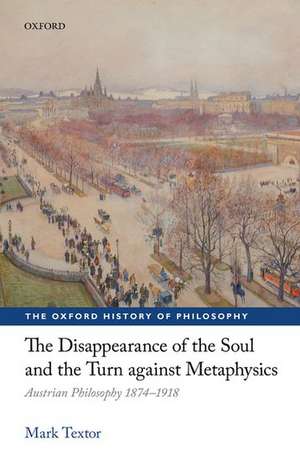The Disappearance of the Soul and the Turn against Metaphysics: Austrian Philosophy 1874-1918: The Oxford History of Philosophy
Autor Mark Textoren Limba Engleză Hardback – 17 sep 2021
Preț: 249.48 lei
Nou
Puncte Express: 374
Preț estimativ în valută:
47.74€ • 51.05$ • 39.80£
47.74€ • 51.05$ • 39.80£
Carte disponibilă
Livrare economică 17-24 martie
Preluare comenzi: 021 569.72.76
Specificații
ISBN-13: 9780198769828
ISBN-10: 0198769822
Pagini: 416
Dimensiuni: 165 x 242 x 27 mm
Greutate: 0.72 kg
Ediția:1
Editura: OUP OXFORD
Colecția OUP Oxford
Seria The Oxford History of Philosophy
Locul publicării:Oxford, United Kingdom
ISBN-10: 0198769822
Pagini: 416
Dimensiuni: 165 x 242 x 27 mm
Greutate: 0.72 kg
Ediția:1
Editura: OUP OXFORD
Colecția OUP Oxford
Seria The Oxford History of Philosophy
Locul publicării:Oxford, United Kingdom
Recenzii
Mark Textor has written a fascinating book about the vanishing of a classical concept in philosophy:the soul...defnitely worth reading.
The book is easily accessible to non-specialists and also has a lot to offer to specialists. It is clearly and engagingly written. Textor writes with acuity, efficiency, and flair. He does a wonderful job presenting a large body of diverse and compli-cated material accurately and concisely. He brings a variety of thinkers into play in his study, putting the discussion on a broad footing. The book stands out for its extensive discussion of a wide range of prominent figures in the period. Textor's study is a valuable contribution to the literature and will surely succeed in stimulat-ing more discussion of this period of Austrian Philosophy. There is much to learn from this rich and informative book. It is to be recommended without reservation to every student of Austrian philosophy.
This is a very impressive book, indeed. It impresses with the huge variety of topics dealt within it; it impresses with the abundance of details disclosed to each of these topics; it impresses with the huge quantity of persons introduced as "players" in the overarching story. However admirably the author masters all this, it is almost unavoidable for readers to lose track of that story. The author, however, helps readers by providing valuable introductions, previews, summaries etc. Moreover, for the multitude of philosophers and psychologists mentioned in the book - many of whom are little-known even to experts — the author puts at the very beginning of the book a list of all players who appear in the course of the book. All in all, the author does an excellent job in clarifying who these players were and what they had to say.
The Disappearance of the Soul and the Turn against Metaphysics is a learned, demanding and profound book that closes a number of research gaps in the Secondary literature on 19th and 20th century philosophy. Textor manages to show that and how the following debates are connected: the controversy about self and soul in psychology, the Debate about the distinction between mental and physical phenomena, the dispute about whether judgements are one or two-termed and the argument about intuitions. [...] Textor's book will without a doubt be a mandatory reading for the next decades in history of philosophy and psychology between 1860 and 1930.
The book is easily accessible to non-specialists and also has a lot to offer to specialists. It is clearly and engagingly written. Textor writes with acuity, efficiency, and flair. He does a wonderful job presenting a large body of diverse and compli-cated material accurately and concisely. He brings a variety of thinkers into play in his study, putting the discussion on a broad footing. The book stands out for its extensive discussion of a wide range of prominent figures in the period. Textor's study is a valuable contribution to the literature and will surely succeed in stimulat-ing more discussion of this period of Austrian Philosophy. There is much to learn from this rich and informative book. It is to be recommended without reservation to every student of Austrian philosophy.
This is a very impressive book, indeed. It impresses with the huge variety of topics dealt within it; it impresses with the abundance of details disclosed to each of these topics; it impresses with the huge quantity of persons introduced as "players" in the overarching story. However admirably the author masters all this, it is almost unavoidable for readers to lose track of that story. The author, however, helps readers by providing valuable introductions, previews, summaries etc. Moreover, for the multitude of philosophers and psychologists mentioned in the book - many of whom are little-known even to experts — the author puts at the very beginning of the book a list of all players who appear in the course of the book. All in all, the author does an excellent job in clarifying who these players were and what they had to say.
The Disappearance of the Soul and the Turn against Metaphysics is a learned, demanding and profound book that closes a number of research gaps in the Secondary literature on 19th and 20th century philosophy. Textor manages to show that and how the following debates are connected: the controversy about self and soul in psychology, the Debate about the distinction between mental and physical phenomena, the dispute about whether judgements are one or two-termed and the argument about intuitions. [...] Textor's book will without a doubt be a mandatory reading for the next decades in history of philosophy and psychology between 1860 and 1930.
Notă biografică
Mark Textor is Professor of Philosophy at King's College London. He previously taught in Bern, Hamburg, Munich, and Zurich. His main areas of research are history of analytic philosophy (especially Frege), philosophy of language, and philosophy of mind both from a historical (Brentano, Stumpf) and a systematic perspective.










